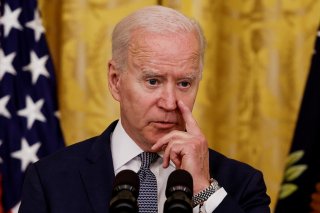Biden Has A Problem: Why Are States Turning Down Federal Unemployment Funds?
Are Republican governors making a mistake?
Here's What You Need to Remember: Many Republican governors have contended that the enhanced weekly unemployment checks are keeping Americans out of the workforce. In an effort to turn around that trend, some states like Arizona and New Hampshire are giving cash payments to those who eventually accept a job.
They may not grab the headlines like traditional $1,400 coronavirus stimulus checks, but the enhanced jobless benefits of $300 per week under President Joe Biden’s American Rescue Plan have been a lifesaver for millions of struggling American families.
But in recent weeks, half of all U.S. states with Republican governors have notified their respective residents that they will pull out of the federal program, with Alaska, Iowa, Mississippi, and Missouri the first states to do so. More states, including Idaho and New Hampshire, will terminate the jobless benefits later this week.
With this in mind, an eye-opening new report released by the Congress’s Joint Economic Committee has revealed that the decision to end unemployment programs earlier than the early-September expiration date will cost local economies over $12 billion.
“By ending these programs early, states are refusing billions of already appropriated federal dollars that could be spent in local groceries, restaurants and retail shops,” the report states.
The data further revealed that pulling out of the program will take $755 million from those receiving unemployment insurance. And since the report estimates that every dollar spent on unemployment leads to $1.61 in local spending, the compounding effects could potentially produce $12 billion in losses from mid-June to early September.
Other data have indicated that millions of Americans are indeed tapping into these unemployment benefits to make ends meet.
According to the Labor Department, the average American received roughly $2,500 a month, including the $300 enhanced supplement, in total unemployment benefits in the month of April. Moreover, nearly half of all households on the receiving end of such benefits also have children under age eighteen, said the U.S. Census Bureau’s Household Pulse Survey.
Research put together by TransUnion has found that four in ten Americans are still continuing to experience income loss compared to before the start of the pandemic, while a report by the Economic Security Project has suggested that more stimulus has the potential to lift twelve million Americans out of poverty.
Many Republican governors, however, have contended that the enhanced weekly unemployment checks are keeping Americans out of the workforce. In an effort to turn around that trend, some states like Arizona and New Hampshire are giving cash payments to those who eventually accept a job.
More financial help, though, is coming in the form of tax refunds from 2020 unemployment benefits, of which about three million were recently sent out by the Internal Revenue Service.
And don’t forget about the expanded child tax credits—amounting to a $250 or a $300 payment per each child every month through the end of the year—which will begin landing in eligible parents’ bank accounts starting July 15.
Ethen Kim Lieser is a Minneapolis-based Science and Tech Editor who has held posts at Google, The Korea Herald, Lincoln Journal Star, AsianWeek, and Arirang TV. Follow or contact him on LinkedIn.
This article was published earlier this year and is being reposted due to reader interest.
Image: Reuters

